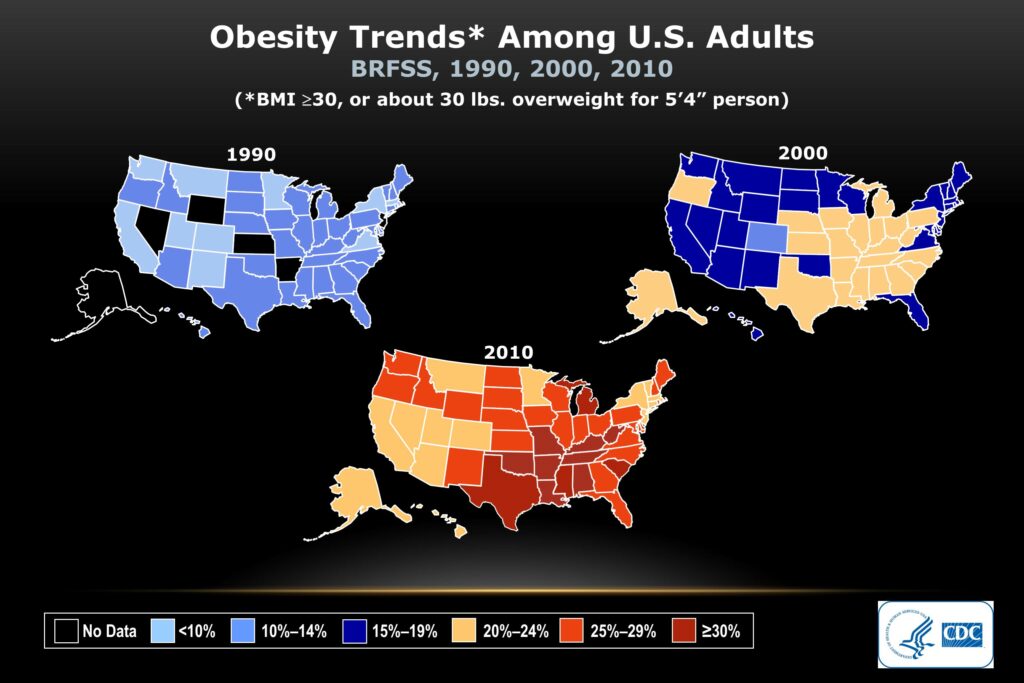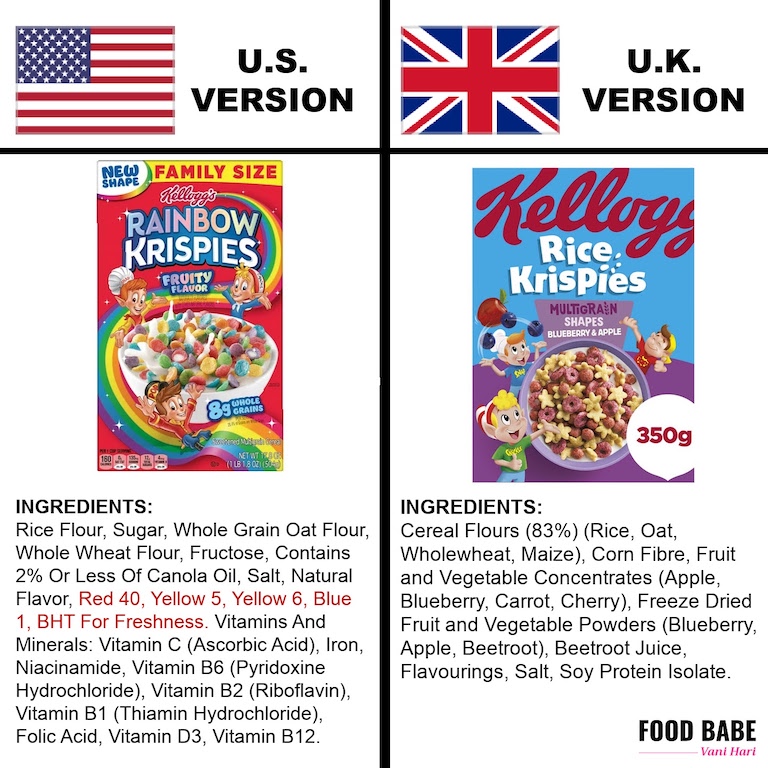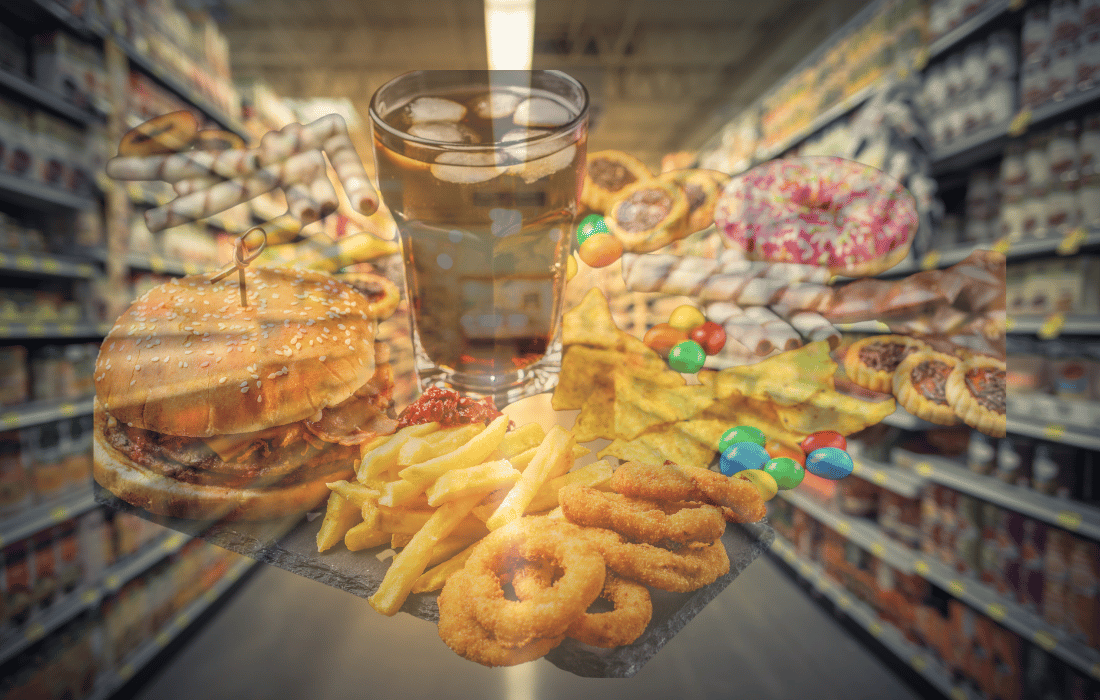The United States is in the grips of a health epidemic. Nearly 42% of adults are classified as obese, with childhood obesity affecting over 14.7 million kids. Chronic diseases, such as type 2 diabetes, heart disease, and certain cancers, have skyrocketed in recent decades, becoming the leading causes of death. The numbers don’t lie: something is deeply wrong with the way we’re nourishing—or failing to nourish—ourselves.
So what’s fueling this alarming trend? The answer lies in the very aisles of our grocery stores. Processed and ultra-processed foods have taken over our food supply, packed with synthetic ingredients, sugar, seed oils, and additives designed to hook consumers and maximize profits. These aren’t just unhealthy indulgences; they are foundational staples of many American diets. And the consequences are devastating.
This crisis didn’t happen by accident. Decades of monopolization by Big Agriculture and the food industry have ensured that these cheap, convenient, and highly profitable foods dominate our markets. Meanwhile, the companies behind these products have built uncomfortably close ties to Big Pharma—a partnership that thrives on keeping the population dependent on medications for diet-related illnesses.
It’s time to shine a light on the tangled web of corporate greed, health decline, and misinformation that has allowed processed foods to reign supreme in the U.S. Here’s the truth behind our health epidemic—and how we can begin to break free.

The Processed Food Epidemic
Processed foods have become an undeniable staple in modern households, providing convenience and affordability. However, these so-called “time-savers” often come at a steep cost to our health. The rise of ultra-processed foods, defined by their high levels of additives, sugars, unhealthy fats, and artificial ingredients, has contributed to an epidemic of chronic illnesses such as obesity, diabetes, heart disease, and even cancer.
A recent study found that people consuming higher levels of ultra-processed foods have a significantly increased risk of early death and cardiovascular diseases. I know, shocker. Furthermore, processed and ultra-processed food consumption is associated with increased systemic inflammation—a root cause of numerous chronic conditions. When we trade real, whole foods for processed alternatives, we are inadvertently fueling this public health crisis.
What makes these foods particularly insidious is their deceptive marketing. Labels like “low fat,” “high protein,” or “fortified with vitamins” create a false sense of security. Yet, these same products are loaded with carcinogenic compounds, endocrine disruptors, and other harmful chemicals that wreak havoc on the body.
Moreover, processed foods are engineered to be addictive. Companies use a calculated blend of sugar, salt, and fat to create a “bliss point,” making it nearly impossible to resist. This addiction not only undermines health but also makes it harder to transition to a cleaner diet.
The Hidden Carcinogens in Everyday Foods
Many of the most beloved processed foods contain carcinogens—compounds directly linked to cancer development. These hidden dangers often lurk behind seemingly harmless ingredients:
1. Artificial Food Dyes
Found in everything from breakfast cereals to candy, artificial food dyes like Red 40 and Yellow 5 have been linked to hyperactivity in children and potential carcinogenic effects. Several studies have also shown the link between these dyes and tumor growth in animal studies. Despite growing evidence, these additives remain prevalent in foods marketed to children.
2. Preservatives
Chemicals like butylated hydroxyanisole (BHA) and butylated hydroxytoluene (BHT) are commonly used as preservatives in snacks and cereals. The International Agency for Research on Cancer (IARC) classifies BHA as a possible human carcinogen, yet it is still approved for use in the United States.
3. Refined Sugars and High-Fructose Corn Syrup (HFCS)
Beyond contributing to metabolic diseases like type 2 diabetes, HFCS and other refined sugars create an inflammatory environment in the body, promoting cancer cell growth. Research published in Nature Communications found that sugar supports tumor growth, making it a “fertilizer” for cancer cells.
4. Seed Oils
Seed oils such as canola, soybean, corn, and sunflower oil are a ubiquitous ingredient in processed foods, marketed as “heart-healthy” alternatives. In reality, these oils are high in omega-6 fatty acids, which promote inflammation when consumed in excess, a key driver of chronic diseases and cancer. Seed oils also contain linoleic acid, which oxidizes under heat, forming harmful compounds like aldehydes that are toxic to the body. A report in The Journal of Lipid Research found a direct link between excessive omega-6 consumption and increased risks of cancer, heart disease, and neurological conditions.
5. Microplastics
Microplastics (MPs) are infiltrating our food, especially processed items like bottled water, milk, and table salt. Studies show MPs can disrupt digestion, damage cells, and increase oxidative stress. Children face the highest risk due to their higher intake relative to body weight. Although current daily intake levels from food may be lower than doses used in toxicological studies, the accumulation of MPs over time raises concerns about their impact on human health, particularly when combined with other environmental toxins.
6. Heavy Metals
Processed foods like rice, quinoa, and snacks often contain dangerous levels of heavy metals like lead, arsenic, and cadmium. These metals are linked to cancer and organ damage, with studies showing high contamination in grains and processed products. Chronic exposure poses serious health risks, especially for children and frequent consumers of these products.
7. Acrylamide
Found in foods cooked at high temperatures, such as potato chips and French fries, acrylamide is classified as a probable human carcinogen. This compound forms during frying or baking, particularly in starchy foods.
8. Pesticide Residues
Processed foods often contain ingredients derived from conventionally grown crops, which are frequently treated with pesticides. Glyphosate, the active ingredient in Roundup, is one such pesticide with established links to cancer. Studies have confirmed glyphosate’s association with non-Hodgkin lymphoma, yet it is still found in almost all processed and ultra-processed foods.
These carcinogenic compounds are not rare exceptions—they’re systemic across the processed food industry, embedded in products that are marketed as convenient and family-friendly.
The Domino Effect on Health
The cumulative effect of these hidden toxins extends far beyond cancer risk. Consistent exposure to these harmful additives has been shown to:
- Disrupt hormones, particularly in children and adolescents.
- Weaken the immune system, making the body more susceptible to disease.
- Exacerbate mental health issues, with links to ADHD, anxiety, and depression.
- Damage the gut microbiome, a cornerstone of overall health.
The Food Industry’s Role: Profit Over Health
The processed food industry thrives on consumer ignorance. Billions are spent annually on marketing campaigns designed to convince families that these products are safe, nutritious, and essential for modern living. However, the reality is far from the cheerful commercials.
Processed food giants often target children with colorful packaging and cartoon characters, instilling brand loyalty from a young age. Additionally, misleading claims like “natural flavors,” “low-fat,” or “heart-healthy” trick consumers into believing they’re making healthier choices.
The Kellogg’s Boycott: A Turning Point in Consumer Awareness

The Kellogg’s boycott, driven by grassroots efforts like MAHA (Make America Healthy Again), is a testament to the growing demand for transparency in the food industry. The movement has brought attention to the unethical marketing and production practices of companies like Kellogg’s, which position their sugary, carcinogenic cereals and snacks as healthy options for kids while packing them with harmful chemicals.
Kellogg’s products have long been a staple in American households, but with increased awareness of the link between their ingredients and chronic health conditions like obesity, ADHD, and metabolic disorders, consumers are walking away in droves. This growing backlash has triggered a sharp decline in Kellogg’s sales, with reports of desperate promotions such as “buy 1, get 3 free” as the company struggles to offload inventory. Parents are sharing photos of empty aisles where healthier options are stocked while Kellogg’s products sit untouched.
Even more striking is Kellogg’s complete social media silence since the boycott gained momentum. Historically, active platforms like Twitter and Instagram have become devoid of their usual promotional content. This retreat is a clear acknowledgment of the company’s inability to counteract the mounting criticism. Activists and parents alike are celebrating this shift as proof that consumer action can hold even the largest corporations accountable.
Robert F. Kennedy Jr. and the Fight for Public Health
Robert F. Kennedy Jr. and the Make America Healthy Again (MAHA) movement tackle broader public health crises, including the pervasive influence of harmful chemicals in both food and medicine. RFK Jr. has long been a champion of health reform, exposing the entrenched ties between big food, big pharma, and regulatory agencies that allow harmful substances to infiltrate the modern diet.
Through the MAHA initiative, Kennedy has been vocal about the need to eliminate toxic additives, including those found in products marketed as “kid-friendly.” His recent push to ban seed oils in the U.S., citing their role in chronic inflammation and rising disease rates, aligns perfectly with the boycott of companies like Kellogg’s. Both movements shine a spotlight on how the industrial food complex has traded the health of consumers—especially children—for profit.
Kennedy’s influence has invigorated these grassroots efforts, providing them with a platform to amplify their voices. As RFK Jr. points out, the fight against harmful food practices is not just about individual health but about addressing the systemic issues that allow such practices to persist. He often highlights Kellogg’s as a case study in corporate irresponsibility, noting how the company’s refusal to reform its ingredient list mirrors a larger trend among food giants unwilling to prioritize public health over their bottom line.
A Unified Call for Change
Together, these efforts—consumer-driven boycotts like the Kellogg’s protest and RFK Jr.’s broader public health advocacy—represent a united front against harmful additives and deceptive practices in the food industry. The synergy between these movements has created a powerful ripple effect, exposing the carcinogenic compounds, inflammatory oils, and artificial additives lurking in many of the products we’ve long trusted.
By shining a light on companies like Kellogg’s, which have profited at the expense of public health, these initiatives send a clear message: Consumers will no longer tolerate deceit. Whether through grassroots boycotts or legislative advocacy, the goal is the same—creating a healthier, more transparent food system for future generations.
This moment marks a pivotal shift in how we approach the food we feed our families. It’s no longer enough to accept marketing at face value. Instead, we must stay informed, demand better, and recognize the incredible impact of sharing these truths. When the public unites around education and action, even the most powerful corporations are forced to reckon with the truth.
The Health Consequences of Processed Foods and Toxins
The effects of processed foods and environmental toxins are wide-ranging and deeply concerning. These substances don’t just impact physical health—they also affect mental well-being, hormonal balance, and even future generations.
Metabolic Disorders
Processed foods, particularly those high in sugar and seed oils, disrupt metabolic function, leading to obesity, type 2 diabetes, and fatty liver disease. The insulin resistance caused by refined sugars creates a cascade of hormonal imbalances, making weight loss and energy regulation nearly impossible.
Hormonal Imbalances
Endocrine disruptors in food packaging and household products mimic or block natural hormones, contributing to:
- Reduced fertility and increased pregnancy complications
- Early puberty in children
- Higher rates of hormone-related cancers, such as breast and prostate cancer
Gut Health and Mental Health
The lack of fiber and abundance of artificial ingredients in processed foods disrupt the gut microbiome, which plays a crucial role in mental health. A compromised microbiome has been linked to anxiety, depression, and autoimmune diseases.
Practical Solutions for Protecting Your Family
Protecting your family from the harmful effects of processed foods starts with intentional, actionable steps. Here’s how to make meaningful changes:
JERF (Just Eat Real Food)
Prioritize whole, unprocessed foods that come straight from nature. Instead of relying on products with unrecognizable ingredients, choose simple, nutritious options like fresh fruits, vegetables, nuts, seeds, and clean proteins. If it doesn’t look like it came from the earth, it probably isn’t good for your body.Focus on Quality
The quality of the food you eat matters just as much as what it is. Whenever possible, choose:- Regenerative organic and grass-fed meats for superior nutrient density and environmental sustainability.
- Organic, pasture-raised eggs rich in essential fats and vitamins.
- Raw milk from organic farms, which is minimally processed and retains its full spectrum of nutrients.
- Supporting local farmers and small producers not only ensures better health outcomes but also helps keep your food system honest and sustainable.
- Educate Your Family
Many people know that processed foods are “bad,” but understanding why can be transformative. Share the detailed data and insights from this article with your children and loved ones. Explain how ingredients like artificial dyes, preservatives, seed oils, microplastics, and heavy metals impact the body over time. Armed with knowledge, your family will be more empowered to make healthier choices. Share This Article
The first step toward change is awareness. Share this article with your network, friends, and community to spread the truth about processed and ultra-processed foods. By helping others understand the dangers, we can collectively shift toward healthier, more intentional food habits.
Your choices can inspire real change—for your family and beyond. By committing to these practices, you’re taking a stand for health and a brighter future.








